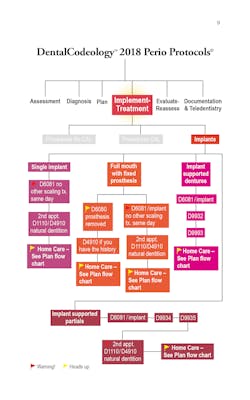Thursday Troubleshooter: Dental implant maintenance coding frustration
Problems! Who doesn't have them? If you have a problem or concern in your dental office position, you might be too close to the situation to solve it yourself. Share your concerns with Team Troubleshooter. The experts will examine your issues and provide guidance. Send your questions to [email protected].
QUESTION: We have patients without regular dentition, so we are not able to use code D1110. They have implants on the maxillary and mandibular with an implant-supported prosthesis on both, so we cannot use 1110 for their prophies. D6080 specifically states removing the fixed prostheses. Delta Dental advises using D6999 by report, but then they changed the code to D6080 (even though we didn’t remove the fixed prostheses). Other insurances don’t recognize that code or don’t have implant coverage, therefore they deny the claim. If you have any advice as to how to submit claims for these procedures, I would love to hear from you.
ANSWER FROM PATTI DIGANGI, founder of DentalCodeology:
These are great questions that many practices are asking. Implants are basically standard of care, yet there is a significant gap in our current CDT treatment codes. Codes and coverage are related but not the same. Coverage is a contract between a dental benefit carrier and a patient’s (or their spouse’s) employer. Some dental offices have contracts with dental benefit carriers that are also contract negotiations. Coverage or non-coverage is not based on the whim of a carrier; it is based on those contracts.
Asking a carrier to provide accurate codes might not be your best option. Carrier responses can tell you what is covered or not covered by a policy, but carriers are not necessarily coding experts. HIPAA determined that CDT is the standard code set for electronic dental records. The reason this is important is because using a code only for the purpose of increasing payment can be a problem. Practitioners are required to use the code that most accurately describes the treatment in both third-party claims and for their electronic health records.
The problem as identified in the question is that there are significant gaps for implant maintenance. There is good news—this can change. CDT codes are decided and annually updated by the Code Maintenance Committee (CMC). Also, the CDT process is available to everyone. Anyone can visit the ADA website to submit for a new code. If all of paperwork is filled out correctly, the submission will be heard by CMC. Passage of a new code takes more than a submission.
Take a proactive part
The DentalCodeology Consortium (DCC) is a group of interested dentists, hygienists, dental assistants, and office managers who have banded together to submit codes. In March 2019, the following submissions were heard:
• Dxxxx—Implant decontamination procedures for fully edentulous patients who exhibit no evidence of active peri-implant disease and have dental implant-supported bars and/or locators that attach to removable prostheses–per arch.
• Dxxxx—Implant decontamination procedures for fully edentulous patients who exhibit no evidence of active peri-implant disease and have fixed hybrid dental implant superstructures and abutments–per arch.
• Dxxxx—Implant decontamination procedures for patients who exhibit no evidence of active peri-implant disease and have one or more dental implant-borne prostheses that are not removable and include abutments and natural teeth–per arch.
• Dxxxx—Scaling and debridement in the presence of inflammation, peri-mucositis and/or peri-implantitis surrounding four or more implant bodies, including cleaning of the implant surfaces, without flap entry and closure.
The DCC also submitted for a change to the current D6081:
• D6081—Scaling and debridement in the presence of inflammation, peri-mucositis and/or peri-implantitis surrounding one to three implant bodies, or mucositis of a single implant, including cleaning of the implant surfaces, without flap entry and closure.
• Use of decontamination modalities that are safe and conducive for arresting the inflammatory response and/or progression of bone loss surrounding the dental implant body. This procedure is not performed in conjunction with D1110, D4910, or D4346.
The support of these submissions was evidenced-based and highly detailed. Unfortunately, they were voted down. The good news is that the DCC will be back and will resubmit again. Anyone who is interested in joining these efforts can visit DentalCodeology.com to join.
So, what are the current options? The attached chart from the DentalCodeology CDT Shifts 2018 book shows the current options for coding.
You are correct that D1110 and D4346 are not accurate because each of them is for teeth. D4910 might be accurate because the words “. . . for the life of the dentition or any implant replacements” is part of the description. Yet, to use D4910, you must have a history of surgical or non-surgical periodontal therapy.
If mucositis is present for any of the implants, D6081 is listed separately for each implant involved. If there is no sign of active disease the only option is D6999 with a report. The report should be a tight description of the conditions that can fit into “Box 35 Remarks” on the claim form, not in a long letter.
Final good news
No matter how accurately you code, coverage is a contract. Practitioners can influence the system, first, by taking a proactive part, and second, when using D_999 and an accurate report.
For many years, another gap was a code for antibacterial irrigation, a common part of many perio protocols. The only option was D4999—unspecified perio procedure, by report. In 2013, the benefits carriers themselves came to the CMC to ask for a code for irrigation. Part of their reasoning was that it had been submitted under D4999 more than 500,000 times in 2012 alone.
How we code and the actions we take make a difference.
Don't be shy! If YOU have a tough issue in your dental office that you would like addressed, send it to [email protected] for the experts to answer. Remember, you'll be helping others who share the same issue. Responses will come from various dental consultants, as well as other experts in the areas of human resources, coding, front office management, and more. These folks will assist dental professionals with their various issues on DentistryIQ because they're very familiar with the tough challenges day-to-day practice can bring. All inquiries will be answered anonymously each Thursday here on DIQ.RECENT TROUBLESHOOTERS
Handling dental patients who are under the influence
Dental team shocked about sale of practice; what should they expect?
Does HIPAA prevent dental assistants from viewing patient ledger and treatment plans?
About the Author
Team Troubleshooter
This column features questions from everyday people who work in dental practices, who have issues they would like addressed by the experts. It no longer runs regularly, but the questions sent in the past still apply to dental practices today. Search "Troubleshooter" on DentistryIQ to read more.

